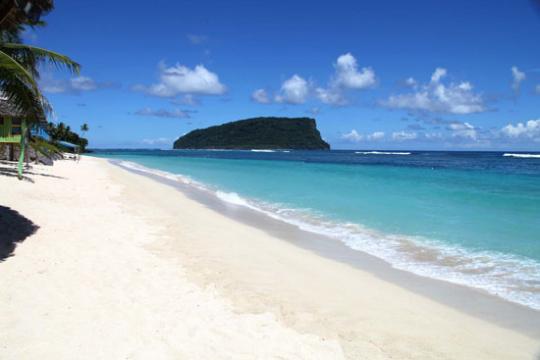
A picture can tell a thousand words but the stunning photos we usually associate with the Pacific Islands often overlook the reality for many who live there. Faced with natural hazards such as cyclones, droughts and earthquakes alongside geographical remoteness and isolation, Pacific Island countries, which make up over a third of small island developing states (SIDS), are some of the most vulnerable nations in the world.
Already this year the Pacific region has been hit by two major disasters; Tropical Cyclone Ian in Tonga in January, followed by flash flooding in Solomon Islands in April. Both disasters had devastating impacts on the economy and livelihoods of local communities. Situated within the cyclone belt and Pacific Ring of Fire, earthquakes, tsunamis and cyclones are frequent. Around 41 tropical cyclones occur each year across the region as well as numerous earthquakes and floods.
Tonga and Vanuatu are listed as the world’s most “at risk” countries from disasters in the World Risk Index. Every year Vanuatu is expected to incur, on average, $48 million (equivalent to 6.6% of GDP) in losses due to earthquakes and tropical cyclones. For Tonga, the annual average loss is 4.4% of the GDP.
Climate change is increasing these vulnerabilities. Tropical cyclones, for instance, are expected to increase in intensity over the coming decades. Extreme events such as floods and droughts will add pressure to fragile island systems and may threaten the entire existence of low-lying island nations.
Take Kiribati for example, an isolated country made up of 32 low-lying coral islands and one raised coral island scattered over an area the size of India. Vast oceans separate it from rest of the world. Population concentration is high. So too is the cost of providing citizens with basic services and infrastructure. It is also one of the Earth’s most vulnerable places to the impact of climate change including rising sea levels.
This coming week is the third International Conference of Small Island Developing States and the overarching goal is to develop genuine and durable partnerships among these groups. The conference will look at all things SIDS, highlighting their unique characteristics and vulnerabilities. Fifteen Pacific island Countries will be represented at the conference. Like Kiribati and Tonga, these countries face the daunting challenge of mitigating the effects of natural disasters and coping with increased vulnerability to climate change—all the while striving to make progress on development.
A lot can be done to minimize and prevent these vulnerabilities and we need to act now. While there are many challenges for Pacific Island countries, there are also many people, organizations and governments working together to overcome them. The World Bank is working with local governments and communities to manage and reduce these risks, while also strengthening the resilience to natural hazards and climate change.
Earlier this year Tropical Cyclone Ian hit Tonga and had devastating impacts. Less than three weeks after the disaster, Tonga was the first country to benefit from an insurance payout ($1.27m) from the Pacific Risk Assessment and Financing Initiative. The pilot provides participating countries with catastrophe risk insurance against major tropical cyclones, earthquakes and tsunamis. Now, as part of the Cyclone Ian Reconstruction and Climate Resilience Project, the World Bank is supporting the government of Tonga to restore housing and facilities to local communities, as well as to strengthen the country’s resilience to natural disasters.
In Kiribati, Phase III of the Kiribati Adaptation Program is helping to provide citizens with safe drinking water and strengthen coastal resiliencethrough a range of protection measures such as building seawalls or planting mangroves.
In Vanuatu, the Bank supported the establishment of a multi-hazard National Early Warning Center, with the latest state-of-the-art technology that shares information from the center with other countries in the region and provides scientific data on weather, volcanic eruptions, sea temperatures, and earthquakes in real time.
2014 is the international year of Small Island Developing States. This year is your chance to get informed about their unique challenges and opportunities, so next time you see a photo from a beautiful beachside resort on one of their many coastlines, you’ll know about the rest of the picture. You’ll know about those who are at the coalface, facing the most extreme risks from disasters, which threaten their homes and lives every year.


Join the Conversation